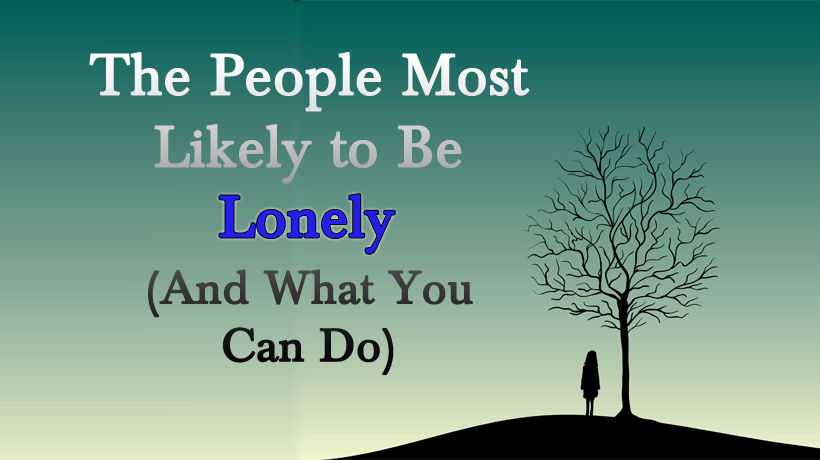Loneliness is a subjective experience that is different for every one of us. Some people define loneliness as a feeling of emptiness or isolation. Others define it as by the need for company or comfort. With these portrayals, there are people more prone to loneliness than others. Who are they? And how can one cope with this feeling of lonesomeness when it is so hard to define?
Who is more prone to loneliness?
Extroverts
The lifestyle website Bustle cited therapist Katie Leikam in their article on loneliness, saying those who are prone to loneliness are those who are extroverted. Many people wouldn’t really think those who are extroverted are lonelier in comparison to those who are introverted. However, an extrovert with multiple friendships can feel loneliness if there isn’t any meaning in their friendships. Bustle explains it can be enjoyable to be around a huge network of friends, but there is still a sense of detachment which makes a person feel lonely. If there isn’t any depth to the friendship, it can feel superficial.
Type A personality
Having a type A personality means being more competitive and acting like a workaholic. According to a 2015 study in the Journal of Personality, which measured personality traits in adult test subjects over 15 years, people who have type A personalities tend to be prone to loneliness.
People with type A personality are interactive and are comfortable with others, so if they don’t find their place with their friends, they can become lonely.
Addiction to social media
Researchers from the University of Pennsylvania published a review in the Journal of Social and Clinical Psychology emphasizing how social media greatly contributes to loneliness. Many people compare their life to others on social media, wishing they led the life of those they see through their screen. People tend to forget that social media isn’t the whole picture and it is refined in a way to show a perfect life.
Even though there are certain people who are more prone to feeling lonely, it is something that most people face. So, what can we do to get rid of that feeling of loneliness? How can we cope with this feeling of loneliness?
How to cope with loneliness
Many times, the feeling of loneliness correlates with the feeling of needing to belong.. It can involve wanting to feel as though you belong with your network of friends, or a sense of belonging in your career, doing something you truly love to do. To overcome that sense of loneliness you must seek out what it is that you need from yourself and others.
Think about what is making you feel lonely
Take the time to understand what it is that makes you feel lonely. Locate where this loneliness is coming from to help better understand what you need to do. The English mental health charity Mind discusses two facets of loneliness: first, people tend to feel lonely because they don’t talk or see people often. Second, even being around people they feel that they aren’t understood. This leads to the feeling of detachment and disconnect.
Build connections
One way to help overcome loneliness is by building new connections. Even before this step, figure out what it is you are interested in. What are your values? Then, surround yourself with people of similar interest. Mind discusses great ways of meeting other people such as volunteering or joining any online community.
How are you feeling?
Mind finally discusses the importance of checking in on yourself. When dealing with loneliness it can take a toll on an individual’s physical and mental health. There are different areas in which you should constantly check to make sure that you are okay.
- Sleeping: Make sure you get at least six to seven hours of sleep a night. Living in New York myself, I find myself constantly working and delaying my sleep. However, sleeping too late or oversleeping can have an impact on both your physical and mental health.
- Self-confidence: Loneliness can hurt anyone’s self-confidence. This keeps way from building new connections and leaves one believing that they aren’t good enough.
- Eating and Exercising: Constantly check your body, make sure you eat right and keep your body moving. You will stay healthier and mentally happier.
- Mental Health: Constantly check your mental health. Feeling of loneliness can hurt peoples mental state. There are different ways to seek help and treatment to help cope with any issues of mental health.
Coping with loneliness is not something that can be done overnight but over a period. It is a learning process where you learn about yourself and other people.
Sources:
https://www.bustle.com/p/7-unexpected-things-that-can-make-you-more-prone-to-loneliness-15827867
https://www.mind.org.uk/information-support/tips-for-everyday-living/loneliness/#.XEAPFlxKg2w
https://onlinelibrary.wiley.com/doi/abs/10.1111/jopy.12188?campaign=wolacceptedarticle&
https://www.simplypsychology.org/personality-a.html
https://guilfordjournals.com/doi/10.1521/jscp.2018.37.10.751



